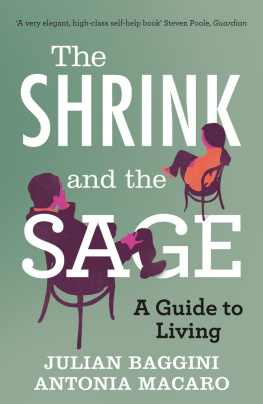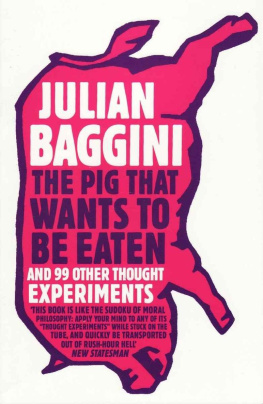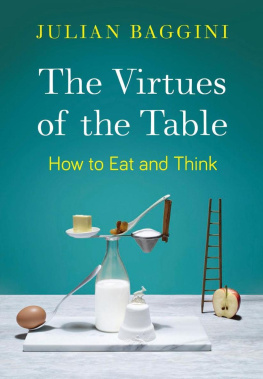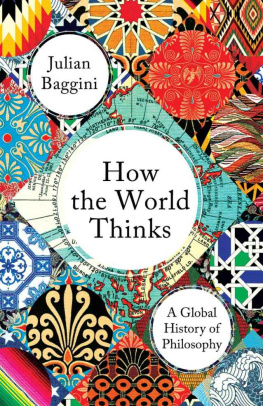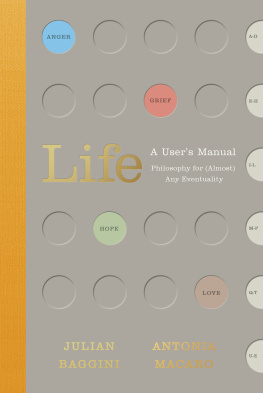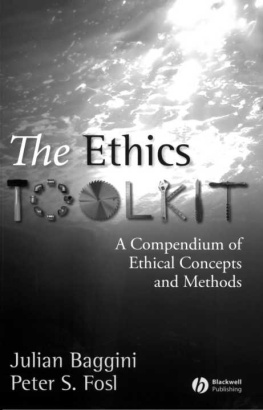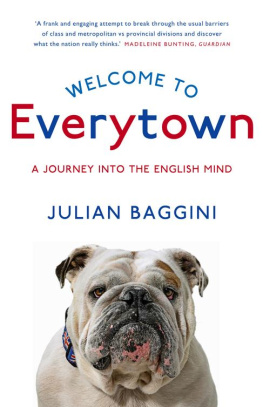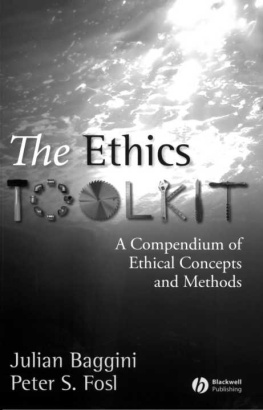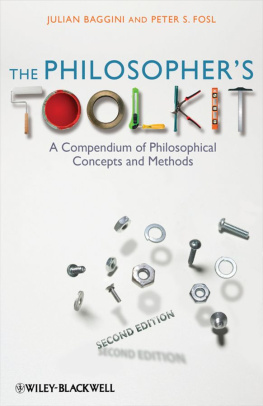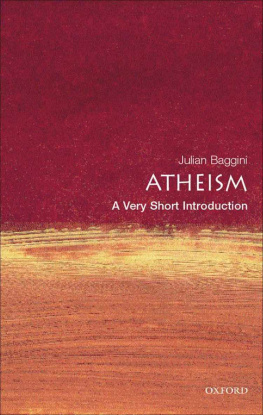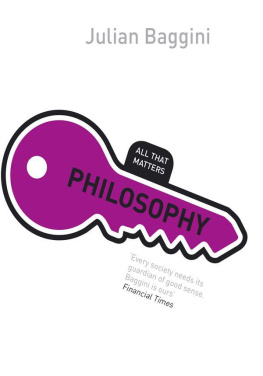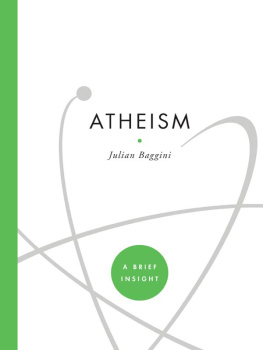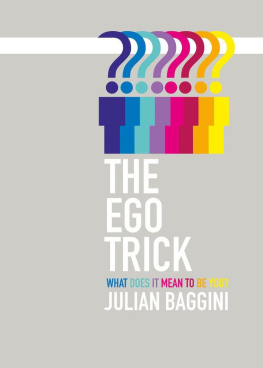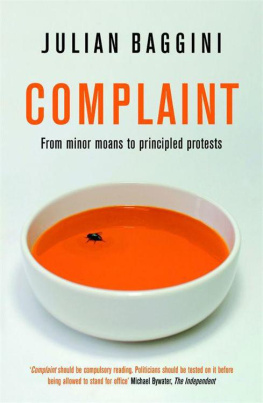

Printed edition published in the UK in 2012 by
Icon Books Ltd, Omnibus Business Centre,
3941 North Road, London N7 9DP
email:
www.iconbooks.co.uk
This electronic edition published in the UK in 2012
by Icon Books Ltd
ISBN: 978-1-84831-378-1 (ePub format)
ISBN: 978-1-84831-379-8 (Adobe ebook format)
Sold in the UK, Europe, South Africa and Asia
by Faber & Faber Ltd, Bloomsbury House,
7477 Great Russell Street,
London WC1B 3DA or their agents
Distributed in the UK, Europe, South Africa and Asia
by TBS Ltd, TBS Distribution Centre, Colchester Road,
Frating Green, Colchester CO7 7DW
Published in Australia in 2012
by Allen & Unwin Pty Ltd,
PO Box 8500, 83 Alexander Street,
Crows Nest, NSW 2065
Distributed in Canada by
Penguin Books Canada,
90 Eglinton Avenue East, Suite 700,
Toronto, Ontario M4P 2YE
Text copyright 2012 Julian Baggini and Antonia Macaro
The authors have asserted their moral rights.
The Shrink and the Sage is the name of a regular column written by the authors which appears in the FT Weekend section of the Financial Times newspaper. This book includes some material based on columns which originally appeared in FT Weekend. Those passages appear with the permission of the copyright owner, The Financial Times Limited.
Cartoon on Chris Madden
No part of this book may be reproduced in any form, or by any means, without prior permission in writing from the publisher.
Typeset in Minion by Marie Doherty
CONTENTS
Julian Baggini is founding editor of The Philosophers Magazine and the author of numerous books including The Pig That Wants to be Eaten and The Ego Trick .
Antonia Macaro has many years experience as an existential therapist and philosophical counsellor, and is the author of Reason, Virtue and Psychotherapy .
INTRODUCTION
Everyone with the slightest jot of wisdom, from the Buddha to the jaded old soak behind the bar, would ruefully nod in acquiescence with writer and broadcaster Garrison Keillors line: Life is a struggle, and if you should feel really happy, be patient: this will pass. No wonder that the marketplace in life guidance is so crowded with both buyers and sellers. Canny shoppers might reasonably conclude: nothing works.
But while its true that no thing works, some things work. There is no secret, magic formula, no algorithm for living a good, satisfying life. But in the accumulated wisdom of the generations there are ideas and practices that can help us to deal with the problems of living that come as the non-negotiable fee for the privilege of being born. If we can use them well, we can develop practical wisdom: the ability to think for ourselves and make better choices about how to live.
There is a huge risk of hubris in daring to write about such matters. But by doing so we do not make any claims about our own wisdom. One of the features of practical wisdom is that you cant tell how much of it people have by finding out what they know. Just as a clever mechanic can accomplish more with a single screwdriver than an incompetent one with a fully-equipped garage, so a little knowledge can go a long way for a wise person, while a lot can be wasted on a fool. All we claim is that we have access to a well-stocked garage, which we invite you to visit and use as you see fit.
Our toolkit is equipped with the resources of both psychotherapy and philosophy. It might not quite look as youd expect. In particular, there is a widespread perception that both psychotherapy and philosophy are centrally concerned with exposing hidden depths. Philosophy pulls back the veil of appearances and reveals the real world for what it is, while psychotherapy is mainly an exploration of the unconscious. But while it is the case that some truths lie buried and things are often not as they seem, there is no reason to systematically concentrate on the invisible rather than the visible. In therapy, for instance, the reasons people give for their behaviour are often more illuminating than speculation about motives they might not be aware of.
We offer no grand unified theory. Our perspectives, tools and insights were gleaned from centuries-old philosophy and recent research in psychology. They also reflect the experience, over many years, of talking to people who were trying to work out how to live, and reflecting on those conversations. But although we draw from many sources, its very important to us that what we say fits into a coherent framework. We have striven to avoid the kind of promiscuous pick-and-mix approach that ends up with a hodgepodge of incompatible, contradictory advice from different thinkers and systems.
We would describe our overall ethos as a minimalist one: while we believe that we can do things to make life better, solve some problems and make others less debilitating, we do not believe that lasting, uninterrupted contentment is a reasonable goal, even if some people do manage to achieve it. We hope and believe our resources can be of help, but they will not solve all your problems because lifes problems are just not like that.
In Part One we scrutinise twenty potentially tricky spheres of life. In Part Two we each explain a little about our approach. But before getting going we thought it would be useful to outline the central ideas of the philosopher and psychologist who has most influenced our thinking about problems of living: Aristotle. His work is a rare find when it comes to questions of how to live. Although he wrote over two thousand years ago, lacking all kinds of knowledge we now take for granted (and of course getting some things completely wrong as a result), his understanding of being human is more insightful and relevant than many modern theories. We have both taken much inspiration from his framework for the good life, and his influence can be seen behind every page of this book. We hope that filling in some of the background to our perspective will help to illuminate both the connections between the topics we discuss and any questions we dont cover within these pages.
If you want to know more, give Aristotles Nicomachean Ethics a go. Its essentially a set of lecture notes and so you may need to join a few dots, but we believe its well worth the effort, as this is one book that really merits the over-used tag of essential reading for everyone.
Although this book has two voices, they are intended to be in harmony, complementing more than contrasting with each other. Whether or not theyre singing the right tune is for you to decide.
THE WAY OF ARISTOTLE
Practical wisdom
To say Aristotle was a philosopher is an understatement. He was arguably the greatest polymath who has ever lived. As well as writing some of philosophys foundational texts on abstract matters of logic and metaphysics, he also turned his mind to biology, drama and the ordering of human affairs. His ability to seamlessly move from the abstract to the concrete is nowhere more evident than in his writings on ethics, and is encapsulated in an idea he put at the centre of a good human life: practical wisdom, phronsis . If we have this well reliably come up with the right judgements about how to act in different situations.
The question is, how do we go about developing it? First of all we need to think through our values and reach a good awareness of the sorts of things that contribute to a good life. Then its a question of gaining the skills to put this understanding into practice. These include thinking clearly about ourselves, our situation, other people, what is and is not possible; sharpening the ability to select and assess potential goals, work out the best way to achieve them, monitor their consequences, and use what we learn to adapt and change.
Next page
